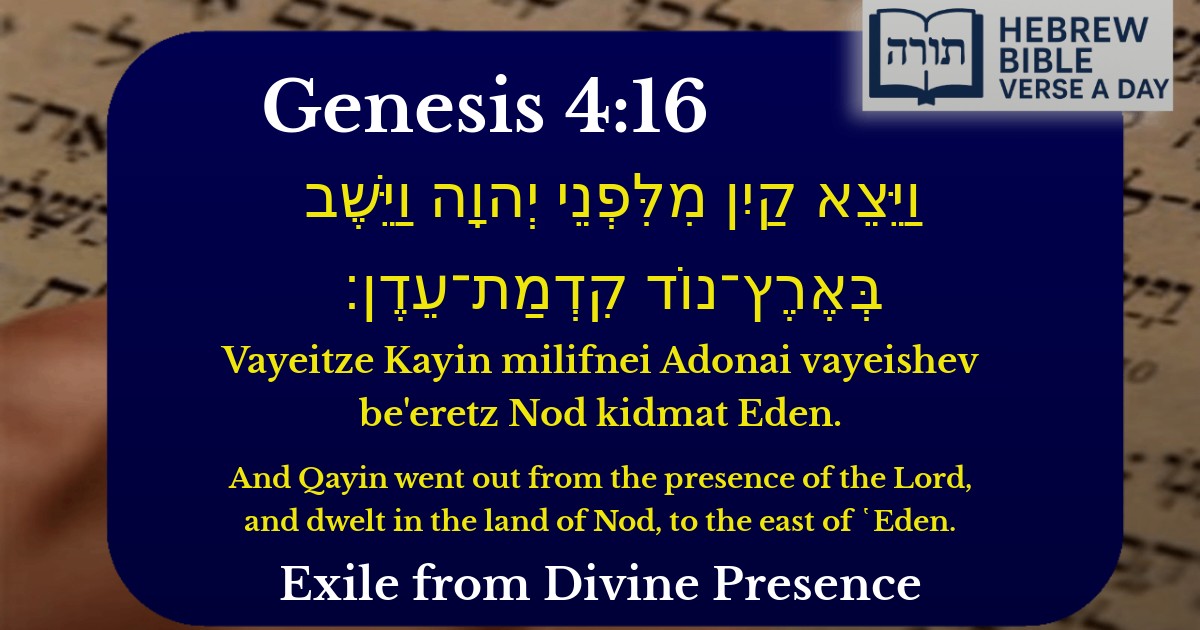Frequently Asked Questions
Q: What does 'the land of Nod' mean in Genesis 4:16?
A: The land of Nod (אֶרֶץ־נוֹד) means 'land of wandering' or 'land of exile.' Rashi explains that it refers to Cain being condemned to a life of wandering after killing his brother Abel. The name 'Nod' comes from the same root as 'nad' (נוּד), meaning 'to wander,' reflecting Cain's punishment of being a restless wanderer (Genesis 4:12).
Q: Why did Cain go 'from the presence of the Lord' in Genesis 4:16?
A: According to the Midrash (Bereshit Rabbah 22:13), Cain's departure from G-d's presence symbolizes his spiritual alienation after committing murder. The Rambam (Hilchot Teshuva 3:11) teaches that true repentance requires returning to G-d, but Cain chose exile instead, showing he did not fully repent. His physical wandering mirrored his spiritual distance.
Q: What is the significance of Cain settling east of Eden in Genesis 4:16?
A: The Talmud (Sanhedrin 37b) notes that east of Eden was outside the original sacred space where Adam and Eve lived. This shows Cain's further separation from holiness. The Midrash (Pirkei DeRabbi Eliezer 21) also connects this to the future Temple's location, suggesting exile began with Cain's departure from Eden's proximity.
Q: How does Cain's exile apply to us today?
A: The Sforno teaches that Cain's story warns against letting sin create distance from G-d. Just as Cain wandered physically and spiritually, we must avoid actions that separate us from holiness. The verse reminds us that teshuva (repentance) requires returning to G-d's presence, not fleeing from it (based on Rambam, Hilchot Teshuva 2:4).
Q: Did Cain repent after being exiled to the land of Nod?
A: Opinions differ. Rashi (on Genesis 4:13) suggests Cain initially expressed remorse but didn't complete repentance. The Zohar (1:36b) states Cain later repented partially. However, the Rambam (Hilchot Teshuva 2:1) uses Cain as an example of incomplete repentance since he didn't correct his ways fully. His exile shows the consequences of unresolved sin.


Understanding the Verse
The verse describes Kayin (Cain) leaving "from the presence of the Lord" and settling in the land of Nod, east of Eden. This follows his punishment for killing Hevel (Abel) and being condemned to wander the earth (Bereishit 4:12). The phrase "from the presence of the Lord" requires careful interpretation, as Hashem is omnipresent (Tehillim 139:7-10). Rashi explains that Kayin was distancing himself from Divine mercy, effectively choosing spiritual exile. The land of "Nod" (נוד) is related to the Hebrew root for "wandering" (נדד), reinforcing his punishment of perpetual restlessness.
The Land of Nod
The Midrash (Bereishit Rabbah 22:13) identifies "Nod" as a place where Kayin continued his rebellious ways, building cities and establishing a corrupt civilization. Ramban (Nachmanides) adds that this land was deliberately east of Eden—symbolizing further removal from the spiritual perfection of Gan Eden. The direction "east" is significant, as it mirrors Adam and Chava's expulsion eastward from Eden (Bereishit 3:24), suggesting a generational pattern of distancing from holiness.
Kayin's Spiritual State
Rabbeinu Bachya notes that Kayin's departure "from the presence of the Lord" reflects a conscious rejection of repentance. Unlike his father Adam, who sought reconciliation after his sin, Kayin embraced his alienation. The Talmud (Sanhedrin 37b) teaches that one who destroys a single life is considered as if they have destroyed an entire world—Kayin's failure to repent for Hevel's murder compounded his guilt. The Sforno emphasizes that dwelling in Nod represents a life devoid of spiritual growth, where Kayin remained entrenched in his flawed character.
Lessons from the Verse